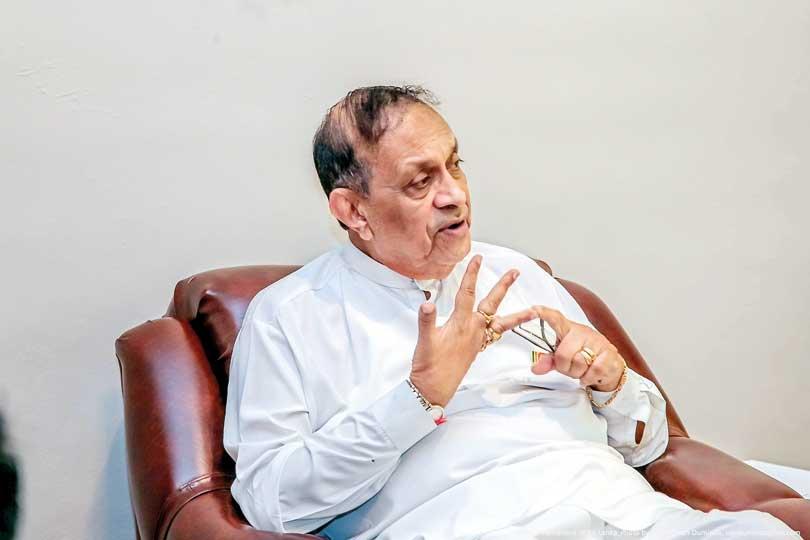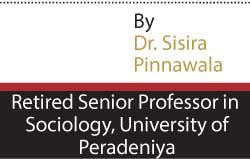07 Aug 2019 - {{hitsCtrl.values.hits}}

 Deshabandu Karu Jayasuriya, M.P. and Speaker of Parliament will be paying respects to Maha Sangha in a ceremony to be held on 7th August presided by the Chief Prelates of the Tri Nikayas and attended by Maha Sanga, Members of Parliament, political leaders and representatives of civil society at BMICH for the honours bestowed upon him for service to the nation and Buddhist religion.
Deshabandu Karu Jayasuriya, M.P. and Speaker of Parliament will be paying respects to Maha Sangha in a ceremony to be held on 7th August presided by the Chief Prelates of the Tri Nikayas and attended by Maha Sanga, Members of Parliament, political leaders and representatives of civil society at BMICH for the honours bestowed upon him for service to the nation and Buddhist religion.
Mr. Karu Jayasuriya is no stranger to awards and recognition. In addition to being honoured by the title Deshabandu, high civilian order of the country, and awards of recognition from Buddhist leadership, he has received various awards from national and international bodies including the Pride of Asia Award for 2019 from Abdul Kalam Institute of Technological Sciences and Order of the Rising Sun First Class Grand Cordon from Japan in 2018. The latter established in 1875 during the Meiji period is the highest award given to a foreign national by Japan. The recent recipients of the award includes Dr. Mahathir Mohamed, the father of modern Malaysia, and Dr. Manmohan Singh the former Prime Minister of India. Abdul Kalam award was given to him for his role in safeguarding democracy in Sri Lanka. It is a coincidence that this award was conferred on him a few months after the conclusion of the Constitutional Crisis of October 2018 in which Mr. Jayasuriya played a crucial role that ensured democracy prevailed in the country.
This brief account is not meant to be a record of his awards or his services to the country. That information is of use for biographical purposes and for leisure time reading. Though quiet and unobtrusive in his ways Mr. Jayasuriya has done his duty by the country and that does not need any third party to document it, as his record is public and speaks for itself. People know his invaluable service both as a philanthropist and socially conscious national leader. However, history will remember him not for his awards but for his role in shaping the history of this country in which he played a crucial, and arguably a history defining, role during the infamous constitutional crisis of October 2018. Mr. Karu Jayasuriya’s timely and firm intervention prevented a disaster that could have had long-term repercussion on the democracy of the country and future of the nation. This therefore is an attempt to assess his contribution to the country and the nation by placing him in the current historical context where many pretenders to national leadership lay claim. Unlike many national political leaders of this country Karu Jayasuriya does not come from a political family though he has a political background dating back to early post-independence politics. Born into a well-known Sinhala Buddhist family of landed gentry from Hapitigama Korale in the Western Province Mr. Jayasuriya was training to be an entrepreneur from the beginning. Having completed his primary and secondary education at Ananda College, one of the premier centres of Buddhist educational revival of the country, and gaining professional training from the Institute of Chartered Shipbrokers in the UK in 1965 and subsequently obtaining its membership, and later its Fellowship, he proceeded to receive training in Advanced Management at INSEAD (Institut Européen d’Administration des Affaires) at Fontainebleau in France, an institute of higher learning ranked among the best business schools in the world. He later became a Fellow of the Chartered Institute of Logistics and Transport.
After completing his Chartered training and Advanced Management studies he joined the national service in 1965 as a second lieutenant in the Army and was involved in active combat service during the 1971 youth insurgency in the south. In the business world which was his early career choice he rose to the top holding positions of Chairman, Chief Executive and Managing Director of a number of reputed commercial establishments in the country. Yet he was destined to be neither a businessman nor a career military man. The fate had for him was something entirely different, to be in national politics and serve the country at the highest levels. But fortunately for the nation he did not make politics his career like the majority of our political leaders for whom politics is lucrative business. For Karu Jayasuriya politics was only a vocation with a deeper meaning and not a career for personal gains and self-aggrandizement.
He entered formal yet not active public politics in 1995 when he was invited by Mr. Ranil Wickremasinghe to be the Chairman of the United National Party, which more or less is a ceremonial position, replacing a giant both in politics and in the business world at the time, Mr. N. G. P. Panditharatne. His formal entry into active politics was in 1997 when he was elected Mayor of Colombo, a position in which he served till 1999. He was made Chief Ministerial candidate for the Western Province at the Provincial Councils elections in 1999 and narrowly lost to Ms. Chandrika Bandaranaike who later went on to become President of Sri Lanka. Mr. Jayasuriya was elected to the Parliament at the General Election in 2000 which his party lost. In the following year the UNP won the General Election and he was elected a Member of Parliament and was made Cabinet Minister of Power and Energy.
As mentioned earlier for Karu Jayasuriya politics was a vocation, a higher ideal with a deeper meaning, not a career for self-advancement. It is this conviction and his principled stand in politics that sets him apart from other politicians who make politics a career. When he felt that the country was at a critical juncture, against conventional wisdom and accepted practice in politics he decided to take a principled stand and support the government of President Rajapaksa and its effort to bring peace to the country for a limited period. At the time it was clear beyond doubt that LTTE was not interested in a peaceful settlement to the conflict in the country and unity at the highest level was needed as the nation was facing disintegration. Mr. Jayasuriya decided to put politics aside and chose the need of the hour, which was country and the nation. Though there have been criticism of his decision at the time the outcome of the action he supported vindicated him. Further, being the man of principles and conviction he decided to leave Mr. Rajapaksa when he found it was no longer possible to be with him without compromising his principles.
The defining period of his political life however began arguably in 2015 when the United National Party sponsored candidate Maithripala Sirisena won the Presidency after a hard fought and acrimonious election campaign defeating his former leader and two term President Mahinda Rajapaksa who was fighting for an unprecedented third term. At the election campaign which was dubbed as ‘People’s Movement for Good Governance and Democracy (Yahapalanaya) Karu Jayasuriya played a leading role and with UNP forming a government subsequently winning the General Election in August same year was unanimously elected speaker of the 8th Parliament of the Democratic Socialist Republic of Sri Lanka.
Post-independence Sri Lanka has seen several illustrious personalities like Sir Francis Molumure, the first speaker of the Parliament of Ceylon and several others like T. B. Subasinghe, Stanley Tillakaratne and Anura Bandaranaike, occupying the Speaker’s Chair and contributing to parliamentary tradition and history by making bold and landmark decisions. When made speaker Mr. Jayasuriya surely would not have known what was in store for him and the defining role he was to play in a few years to come other than that he was among an illustrious company. The defining moment that brought Karu Jayasuriya to the national political limelight came in three years after his election as speaker, exactly three years one month and twenty six days, when President Maithripala Sirisena suddenly decided to abandon his parliamentary ally and partner in government the United National Party, sacked the incumbent Prime Minister and UNP leader Mr. Ranil Wickremasinghe and appointed his erstwhile leader and rival Mr. Mahinda Rajapaksa Prime Minister and then, finding that his move was backfiring, decided to prorogue the Parliament and later dissolved it. Both decisions of the President were declared unconstitutional and invalid by the Supreme Court of the country subsequently and that ended the crisis. The crisis ended with the court’s decision but not without chaos and mayhem in the country and in Parliament that lasted 52 days until the President was forced to backtrack and re-appoint Mr. Ranil Wickremesinghe Prime Minister. During the period of near anarchy that ensued, most functions of government stood stand still, but Mr. Jayasuriya stood firm for parliamentary traditions, democracy and by the nation and made sure that democracy is preserved and achievements of 2015 remained. This was a period of shame when people’s representatives were for sale for which even the highest office of the country was alleged to have been involved. In addition to financial and other inducements the media were also full of news about alleged threats and intimidations forcing MPs to change sides. The parliamentary chamber itself was in chaos and became a battle ground for supporters of rival factions fighting for dominance blatantly disregarding the norms of parliamentary conduct and also normal laws of the country. Mr. Jayasuriya’s history defining role during the chaos and uncertainty that followed the Constitutional Crisis in spite of personal insults, vilifications and also threats of bodily harm, defined not only the final outcome but also the leader he is.
During the Constitutional crisis the country was in danger of losing the place it had earned with difficulty as result of the arduous struggle of the People’s Movement for Democracy and Good Governance (Yahapalanaya) in 2015, and becoming an international pariah and a failed state, or in popular jargon a banana republic. There were distractors and critics who accused Mr. Jayasuriya for protecting a government that was unpopular and did not have minority support. There were also accusations that he was preventing the will of the people by blocking new elections so that the voter can decide. He was doing none of these. He was only preserving democracy by asserting the rights of the elected representative and authority of the Parliament over unconstitutional interferences that would have long-term repercussions on the democratic institutions of the country. Thanks to Karu Jayasuriya’s firm and resolute stand that never gave into pressure, helped manage the situation and to avert the danger enabling Sri Lanka to remain in the community of civilized nations. Had it not been for his uncompromising stand for democracy in the country one can only guess what the country would be today. A man of his leadership qualities who has rendered a silent yet invaluable service to the nation all throughout his political life and played a history defining role at the moment when it was needed certainly deserves more. He certainly possesses lot more to give to the nation and what it takes to be in the highest office of the country. Hopefully, the future holds for him what he really deserves.
08 Jan 2025 2 hours ago
08 Jan 2025 2 hours ago
08 Jan 2025 3 hours ago
08 Jan 2025 3 hours ago
08 Jan 2025 4 hours ago